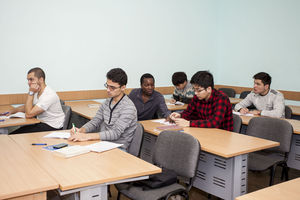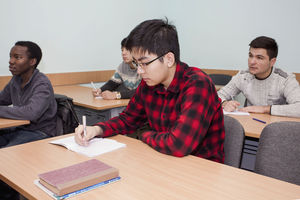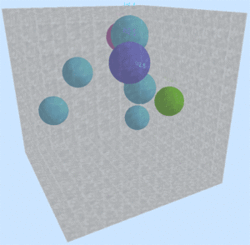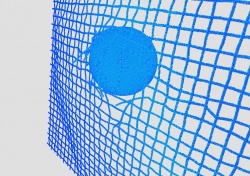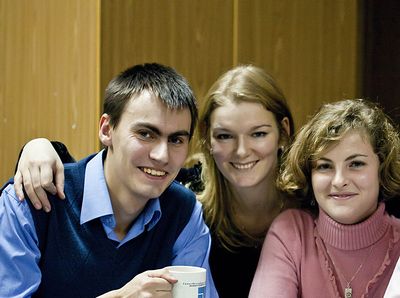Difference between revisions of "International Master Degree Program"
(→MSc in Mechanics and Mathematical Modeling) |
(→Teaching methods) |
||
| (10 intermediate revisions by 3 users not shown) | |||
| Line 7: | Line 7: | ||
The MSc program is led by the top-ranked professors of the Institute of Mathematics and Mechanics, St. Petersburg Polytechnic University, as well as the top European technical universities. The underlying concept of MSc “Mechanics and Mathematical Modeling” is to provide the students with a balanced combination of the fundamental knowledge and practical skills in mechanics to model various phenomena in physics, social sciences, biology, economy, etc. All lectures and seminars are delivered in English. | The MSc program is led by the top-ranked professors of the Institute of Mathematics and Mechanics, St. Petersburg Polytechnic University, as well as the top European technical universities. The underlying concept of MSc “Mechanics and Mathematical Modeling” is to provide the students with a balanced combination of the fundamental knowledge and practical skills in mechanics to model various phenomena in physics, social sciences, biology, economy, etc. All lectures and seminars are delivered in English. | ||
| − | '''Objective | + | '''Program Objective''' |
| − | The program is aimed at training highly professional scientists and engineers with the background and practical experience in theoretical mechanics, computational mechanics | + | The program is aimed at training highly professional scientists and engineers with the background and practical experience in theoretical mechanics, computational mechanics, mathematical modeling and simulations, and distributed computing. Upon graduation, the participants will acquire practical skills and fundamental knowledge for professional career development in international engineering or research companies. Special focus is set on renewable energy, namely, the skills can be applied to reliability and strength analysis of such alternative energy sources as solar panels and wind power equipment, as well as power stations based geo- and hydrothermal energy, and ocean energy. |
'''Financial support''' | '''Financial support''' | ||
| Line 19: | Line 19: | ||
Please note that after you pass qualifying tests your application will be considered locally at the university you have chosen, and there is no guarantee that you will enter this particular university. | Please note that after you pass qualifying tests your application will be considered locally at the university you have chosen, and there is no guarantee that you will enter this particular university. | ||
| − | '''Attention!''' If you apply for this government financial support and choose the '''International MSc Program “Mechanics and Mathematical Modeling” at Peter the Great St. Petersburg Polytechnic University''', we will make every effort to convince the University authorities to support your application. | + | '''Attention!''' If you apply for this government financial support and choose the '''International MSc Program “Mechanics and Mathematical Modeling” at Peter the Great St. Petersburg Polytechnic University''', we will make every effort to convince the University authorities to support your application. Please, do not hesitate to contact us regarding any queries you may have. |
'''Key advantages ''' | '''Key advantages ''' | ||
| Line 44: | Line 44: | ||
Compulsory courses, MSc thesis. The compulsory lecture courses and MSc Thesis are included into the syllabus. | Compulsory courses, MSc thesis. The compulsory lecture courses and MSc Thesis are included into the syllabus. | ||
| − | [[File: IMG_7267.JPG|300px|left]] | + | [[File: IMG_7267.JPG|300px|thumb|left]] |
'''''1st semester (30 credits)''''' | '''''1st semester (30 credits)''''' | ||
| − | *[[Computational mechanics]] | + | *[[Computational mechanics|Computational Mechanics]] |
*[[Nonlinear dynamics processes|Nonlinear Dynamics]] | *[[Nonlinear dynamics processes|Nonlinear Dynamics]] | ||
*[[Mathematical methods in mechanics|Mathematical Methods in Mechanics]] | *[[Mathematical methods in mechanics|Mathematical Methods in Mechanics]] | ||
*[[Tensor analysis|Tensor Calculus]] | *[[Tensor analysis|Tensor Calculus]] | ||
| − | *[[ | + | *[[Thermodynamics]] |
| + | *[[Energy and Environment]] | ||
| + | *[[Dynamics of Thin-Walled Structures]] | ||
*[[Advanced Problems in Mechanics|Advanced Problems in Mechanics]] | *[[Advanced Problems in Mechanics|Advanced Problems in Mechanics]] | ||
| + | [[File: IntStud.JPG|300px|thumb|right]] | ||
| − | |||
'''''2nd semester (30 credits)''''' | '''''2nd semester (30 credits)''''' | ||
| − | *[[ | + | *[[Energy and Environment]] |
| − | *[[ | + | *[[Risk Assessment and Analysis]] |
| − | *[[ | + | *[[Computer Modeling]] |
| − | *[[ | + | *[[Computational mechanics|Computational Mechanics]] |
| + | *[[Waves in Continua]] | ||
*[[Advanced Modeling in Mechanics]] | *[[Advanced Modeling in Mechanics]] | ||
*[[Research Seminar]] | *[[Research Seminar]] | ||
[[File:5.gif|250px|thumb|left]] | [[File:5.gif|250px|thumb|left]] | ||
| − | |||
| Line 76: | Line 78: | ||
*[[Dynamics of discrete media|Dynamics of Discrete Media]] | *[[Dynamics of discrete media|Dynamics of Discrete Media]] | ||
| − | *[[ | + | *[[Computer Modeling]] |
| + | *[[Computational mechanics|Computational Mechanics]] | ||
| + | *[[Micromechanics of Heterogeneous Media]] | ||
*[[Personal research project|Personal Research Project]] | *[[Personal research project|Personal Research Project]] | ||
| − | |||
| Line 103: | Line 106: | ||
==Teaching methods== | ==Teaching methods== | ||
| − | The | + | The process of education consists of basic lectures and practical classes, supplemented with short- and long-term courses by local and visiting professors. There is aso a possibility of individual training plan based on the students’ scientific interests, which provides a wide choice of case studies, cross-cultural team work, expert workshops, study visits to enterprises and internships at research centers and companies of St. Petersburg. Hands-on training courses help to plunge into the cutting edge scientific computing. Special resources of SPbPU, the supercomputing center and digital fabrication laboratory “Fab Lab Polytech” will be available for students. |
'''Program Staff''' | '''Program Staff''' | ||
| − | [[Anton Krivtsov| Prof. Anton M. Krivtsov]], Head of Department | + | [[Anton Krivtsov| Prof. Anton M. Krivtsov]], Head of the Department of Theoretical Mechanics |
[http://www.ipme.ru/ipme/labs/he/indeng.htm Prof. Dmitry A. Indeitsev], Scientific Advisor of the Institute for Problems in Mechanical Engineering of Russian Academy of Sciences | [http://www.ipme.ru/ipme/labs/he/indeng.htm Prof. Dmitry A. Indeitsev], Scientific Advisor of the Institute for Problems in Mechanical Engineering of Russian Academy of Sciences | ||
| Line 114: | Line 117: | ||
[http://scholar.google.com/citations?user=Ge1nBMwAAAAJ&hl=en Prof. Alexey V. Porubov] | [http://scholar.google.com/citations?user=Ge1nBMwAAAAJ&hl=en Prof. Alexey V. Porubov] | ||
| − | |||
| − | |||
[http://www.ipme.ru/ipme/labs/mmmm/lena.htm Dr. Elena N. Vilchevskaya] | [http://www.ipme.ru/ipme/labs/mmmm/lena.htm Dr. Elena N. Vilchevskaya] | ||
| Line 121: | Line 122: | ||
[[O.S. Loboda| Dr. Olga S. Loboda]] | [[O.S. Loboda| Dr. Olga S. Loboda]] | ||
| − | [[ | + | [[Vitaly Kuzkin| Dr. Vitaly A. Kuzkin]] |
| − | |||
| − | |||
[[Podolskaya Ekaterina | Dr. Ekaterina A. Podolskaya]] | [[Podolskaya Ekaterina | Dr. Ekaterina A. Podolskaya]] | ||
[[Александр Аневич Ле-Захаров| Dr. Alexander A. Le-Zakharov]] | [[Александр Аневич Ле-Захаров| Dr. Alexander A. Le-Zakharov]] | ||
| + | |||
| + | [[Mikhail_Babenkov| Dr. Mikhail B. Babenkov]] | ||
[[Panchenko Artem| MSc. Artem Yu. Panchenko]] | [[Panchenko Artem| MSc. Artem Yu. Panchenko]] | ||
| + | |||
| + | [[D.V. Tsvetkov| MSc. Denis V. Tsvetkov]] | ||
[http://www.ovgu.de/Altenbach.html Prof. Dr.-Ing.habil.Dr.h.c.mult. Holm Altenbach] | [http://www.ovgu.de/Altenbach.html Prof. Dr.-Ing.habil.Dr.h.c.mult. Holm Altenbach] | ||
| − | [ | + | [https://www.researchgate.net/profile/Matti_Alatalo Prof. Matti Alatalo] |
| − | |||
| − | |||
| − | |||
| − | |||
| − | |||
| − | Prof. Matti Alatalo | ||
| − | Prof. | + | [https://www.lkm.tu-berlin.de/menue/mitarbeiterinnen_sprechstunden/prof_dr_rer_nat_w_h_mueller/ Prof. Dr. rer. nat. W. H. Müller] |
Revision as of 15:27, 13 January 2017
Contents
MSc in Mechanics and Mathematical Modeling
Institute of Applied Mathematics and Mechanics
Program supervisor: Prof. Anton M. Krivtsov, DSc, Head of the Department of Theoretical and Applied Mechanics
The MSc program is led by the top-ranked professors of the Institute of Mathematics and Mechanics, St. Petersburg Polytechnic University, as well as the top European technical universities. The underlying concept of MSc “Mechanics and Mathematical Modeling” is to provide the students with a balanced combination of the fundamental knowledge and practical skills in mechanics to model various phenomena in physics, social sciences, biology, economy, etc. All lectures and seminars are delivered in English.
Program Objective
The program is aimed at training highly professional scientists and engineers with the background and practical experience in theoretical mechanics, computational mechanics, mathematical modeling and simulations, and distributed computing. Upon graduation, the participants will acquire practical skills and fundamental knowledge for professional career development in international engineering or research companies. Special focus is set on renewable energy, namely, the skills can be applied to reliability and strength analysis of such alternative energy sources as solar panels and wind power equipment, as well as power stations based geo- and hydrothermal energy, and ocean energy.
Financial support
The Government of Russia offers international applicants a possibility to get a financial support (state-funded spots) for the entire duration of the chosen educational program. The financial support covers the tuition fee, accommodation in the university dormitory and an average monthly scholarship.
You can read more about the application process here.
Please note that after you pass qualifying tests your application will be considered locally at the university you have chosen, and there is no guarantee that you will enter this particular university.
Attention! If you apply for this government financial support and choose the International MSc Program “Mechanics and Mathematical Modeling” at Peter the Great St. Petersburg Polytechnic University, we will make every effort to convince the University authorities to support your application. Please, do not hesitate to contact us regarding any queries you may have.
Key advantages
1. The graduates will have an opportunity to work in research institutes, centers and laboratories. They will be able to find employment at R&D and engineering departments of oil and gas, car-making, power and engineering, or aerospace industries among others.
2. The balanced combination of the theoretical courses in mechanics and mathematics with the practical exercises, workshops and IT training sessions, simulations and distributed computing.
3. Unique opportunities for international academic mobility: a semester abroad at one of SPbPU partner universities.
4. An unrivalled opportunity for Russian and international students to participate together in SPbPU academic and extracurricular activities.
5. Support for the students' individual research project and technical ideas.
Program structure
Duration and format
The course lasts for two years of full-time study on a contract basis. The Double Degree Program with Leibniz University Hanover (LUH) and Lappeenranta University of Technology (LUT). Short-term (2 months) internships at Hamburg University of Technology (TUHH) and LUH, long-term (6 months – 1 year) internships at LUT.
Program content
Compulsory courses, MSc thesis. The compulsory lecture courses and MSc Thesis are included into the syllabus.
1st semester (30 credits)
- Computational Mechanics
- Nonlinear Dynamics
- Mathematical Methods in Mechanics
- Tensor Calculus
- Thermodynamics
- Energy and Environment
- Dynamics of Thin-Walled Structures
- Advanced Problems in Mechanics
2nd semester (30 credits)
- Energy and Environment
- Risk Assessment and Analysis
- Computer Modeling
- Computational Mechanics
- Waves in Continua
- Advanced Modeling in Mechanics
- Research Seminar
3rd semester (30 credits)
- Dynamics of Discrete Media
- Computer Modeling
- Computational Mechanics
- Micromechanics of Heterogeneous Media
- Personal Research Project
4th semester (30 credits)
Scientific and Research work
The scientific work comprises of two research directions: Discrete Media Mechanics and Continuum Mechanics.
The researches in the area of Discrete Media Mechanics are run by the joint laboratory of the Department Theoretical an Applied Mechanics and Institute for Problems in Mechanical Engineering of Russian Academy of Sciences.
Laboratory "Discrete Models in Mechanics" carries out researches on the various problems of the modern science: formulating fundamental laws of the discrete media mechanics; developing models of the interparticle interaction; defining properties of the discrete media at the different scale levels; establishing the relationship between the micro- and macro- properties of the discrete media; modeling of the thermomechanical properties of crystalline and amorphous materials, materials with a nanostructure; shock wave processes in solids; dynamics of granular media; fracture and structural phase transitions; chemical processes; astrophysical processes; sociological processes; biological evolutionary processes, etc.
Various analytical and numerical models in the field of Continuum Media Mechanics being proposed by the researchers of the Department describe the following phenomena: thermal conductivity, internal friction, electromagnetic phenomena, interaction of electromagnetic fields with matter, phase transformations, chemical reactions, fracture, deformation of thin-walled structures and nano-objects. In particular, the researchers propose new models of a particle with a complex internal structure and extra degrees of freedom, as well as thermomechanical processes based on the models of thermal conductivity; develop fundamentals and methods of experimental mechanics, models of solid-state transitions and transitions from liquid to gas; describe the influence of the form of the strain state and material parameters on the kinetics of new phase formation.
The Department conducts applied investigations for the leading Russian research organizations, e.g. reliability of nuclear power plants; inertial navigation and sports biomechanics, modeling of oil and gas production, modeling of coke formation in rocket engines, thermal, electrical and strength analysis of aluminum electrolytic cells, development of calculation methods for thin-walled structures, high-speed video and photomicrography, etc.
Teaching methods
The process of education consists of basic lectures and practical classes, supplemented with short- and long-term courses by local and visiting professors. There is aso a possibility of individual training plan based on the students’ scientific interests, which provides a wide choice of case studies, cross-cultural team work, expert workshops, study visits to enterprises and internships at research centers and companies of St. Petersburg. Hands-on training courses help to plunge into the cutting edge scientific computing. Special resources of SPbPU, the supercomputing center and digital fabrication laboratory “Fab Lab Polytech” will be available for students.
Program Staff
Prof. Anton M. Krivtsov, Head of the Department of Theoretical Mechanics
Prof. Dmitry A. Indeitsev, Scientific Advisor of the Institute for Problems in Mechanical Engineering of Russian Academy of Sciences
Prof. Dr.-Ing.habil.Dr.h.c.mult. Holm Altenbach
Prof. Dr. rer. nat. W. H. Müller
Laboratories and equipment
1. Laboratory of the Department of Theoretical Mechanics: supercomputers, 3D-model of the crystal structures, models of machines and mechanisms
2. Fab Lab Polytech: milling machines, cutting machine, 3D-printers, laser cutter and engraver, cutting plotter, laser machine, bending machine, bandsaw
3. Studio "Photomechanics": high-speed video and photomicrography and photographic equipment.
PhD programs
The following graduate courses are offered at Department of Theoretical and Applied Mechanics:
- Theoretical Mechanics (01.02.01);
- Solid Mechanics (01.02.04);
- Mathematical Modeling, Numerical Methods and Software Complexes (05.13.18).
The possible research topics are listed here.
To sign up for an interview, write us an email to loboda_omail.ru, kspfrolovagmail.com
Key facts
Admission requirements: Applicants are required to hold a Bachelor’s, Specialist’s or Master’s degree in the related subject area. Applicants should demonstrate English language proficiency at B+ level
Admission tests: An examination in the field of mechanics and an interview in English with a program coordinator (in person or via Skype)
Admission procedure: An applicant must complete a written online application. The application deadline is June 30. The applicants may find additional information at the official website of SPbPU: http://english.spbstu.ru/
Semester Begin Date: September 1 (Fall Semester)
Length of program: 2 years
Degrees awarded: Master of Science (MSc)
Tuition fees: to be announced
Contact details
Peter the Great St. Petersburg Polytechnic University
Dr. Olga Loboda, Program Coordinator
29, Polytechnicheskaya str., University building, 195251 St. Petersburg
Telephone: +7 952 247 40 33
E-mail: tmech.imdpgmail.com
TAGS: Master Mechanics. Master Engineering. Master Russia. MS program.
